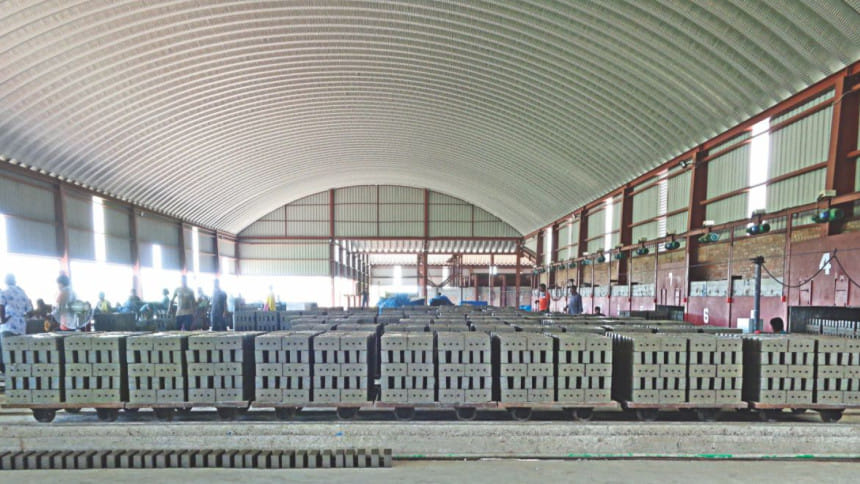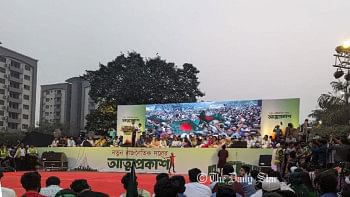Eco-friendly brick kilns growing in numbers

Cleaner and more efficient modern brick kilns are rising in numbers in a development that bodes well for the country's efforts to cut down on air pollution.
The traditional fixed chimney kilns (FCKs) emit large quantities of carbon dioxide and other environmental pollutants into the atmosphere each year, causing a harmful impact on health, agricultural yields and climate.
Until February this year, 121 modern brick kilns, including Hybrid Hoffman Kiln (HHK) and tunnel kiln, have been established and more such kilns are set to come into operation in the coming months, said the Department of Environment (DoE).
“Investors have realised that the days of making bricks through the traditional method are over,” said DoE Director Md Ziaul Haque.
The pace of shift to modern and environment-friendly brick making technologies has picked up after the DoE, instead of issuing environmental clearance certificates for conventional kilns, started encouraging entrepreneurs for using improved technologies.
The government also began to enforce the Brick Making and Kiln Establishment (Control) Act 2013 from July 2014 to control air pollution, deforestation, loss of land fertility and to protect public health.
The law prohibits the use of wood for firing brick and soil of farmland and hills as raw material to make bricks.
It also encourages the conversion of conventional brick kilns into energy-efficient and environment-friendly ones such as HHK, zigzag, automatic or tunnel kilns.
The demand for bricks is on the rise as an increased number of infrastructure projects is being taken in the country that sees its economy expand by more than 6 percent every year.
Until February, 4,227 brick kilns out of the 6,646 have been converted into modern ones. Of them, 4,108 kilns have been converted into zigzag or improved zigzag kilns and the rest into HHK and tunnel kilns, according to the DoE.
Some 2,541 FCKs are yet to be converted into modern kilns, according to data from the DoE.
Haque of the DoE said the conventional brick kilns will be phased out gradually.
Bangladesh produces 1,720 crore pieces of bricks annually, according to a 2011 World Bank report. The Washington-based multilateral lender, in the report, forecasted that the demand will rise 2-3 percent per year for the next ten years.
Modern brick kilns accounted for nearly 170 crore pieces, according to BN Dulal, secretary general of Bangladesh Auto Brick Manufacturers Association.
The demand for bricks made by modern kilns is rising, particularly from those who are building green structures, said Rabiul Ahsan, managing director of Stone Bricks Ltd, which has the capacity to produce 3 lakh pieces of bricks daily.
“We had to do lots of marketing to educate people about the bricks from automated kilns,” he added.
The pace of investment in modern and automatic tunnel kilns increased in recent years due to the extension of low-cost loans by banks and financial institutions, he said.
In September 2012, the Bangladesh Bank introduced a refinance loan scheme worth $50 million to encourage environment-friendly and automatic brick kilns in the country. The Asian Development Bank provided the fund.
State-run Infrastructure Development Company Ltd (Idcol) also started providing low-cost financing for the establishment of environment-friendly automatic tunnel kilns. Idcol has so far approved a total of Tk 147 crore loans for six auto brick manufacturing projects, and three of the kilns are expected to come into operation this year, said a senior official of the state-run financier.
The modern kilns are capable of producing higher number of bricks than the conventional kilns, according to Dulal.
Although modern kilns require higher investment, these are profitable in the long run, said Dulal, who also set up a tunnel kiln that is expected to come into operation in July-August this year.
Tunnel kilns or HHKs can produce more bricks compared to the traditional kilns. Such kilns also save land and reduce environmental pollution, he said.
However, the number of modern brick kilns has not increased in line with the expectation, said Md Adu Bakar, secretary general of the Bangladesh Brick Manufacturing Owners Association.
“The establishment of such kilns requires large investment and banks are unwilling to lend to the traditional small brick kiln owners. Some large investors are coming to set up these kilns,” he added.
DoE Director Haque said it is necessary to declare the brick-making sector an industry to increase the number of modern brick kilns. “We are also considering an alternative brick production system, which does not allow the use of topsoil.”

 For all latest news, follow The Daily Star's Google News channel.
For all latest news, follow The Daily Star's Google News channel. 



Comments